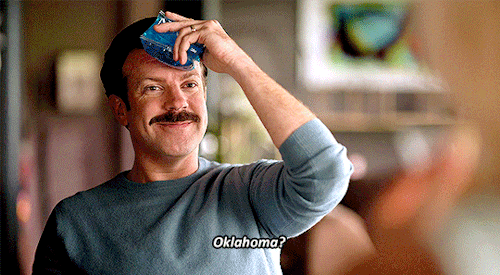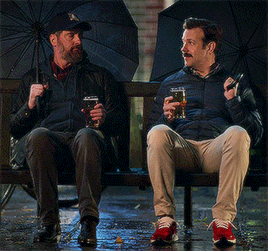The Ted Lasso Relationship Guide: Ted and Michelle Break Up
Can there be a good divorce?
We have spent the past few weeks talking about the toxic relationship between Rebecca and Rupert, but the entire premise of the show is that Ted has moved to London to coach soccer to give his marriage some space. Today I want to talk about the episode “Tan Lines” which is when Ted and Michelle agree to a divorce. I will be taking a few liberties here because honestly, we don’t get a lot of the backstory on Ted and Michelle’s relationship before he moves to London.
The episode opens with Ted opening up to Rebecca about the struggles he and Michelle were having, primarily coming from Michelle. He talks about the code word “Oklahoma” that meant they had to tell the whole truth, and that his wife said that his “constant optimism was too much.”
When Michelle and Henry arrive in London, things seem good. They have a fun time visiting the town and building a double decker bus, but the next morning, Ted finds Michelle at the window crying. She tries to brush it off, but when Ted insists by declaring Oklahoma, she confesses that she hopes that she’ll feel the way she felt when they first married, but that maybe marriage just doesn’t work that way and she’ll keep trying.
As Ted realizes that trying to hold onto the marriage is hurting the woman he loves, he tells her that she doesn’t have to keep trying. As he laments that he promised himself he would never quit anything, she tells him that he’s not quitting, but merely letting her go. They embrace and she leaves. (Watch the breakup scene here.)
This was an episode that I both love and had some questions about.
On one hand, I love the idea of a couple that ends a marriage not just amicably, but kindly. These are not people who hate each other or never want to see each other again. They have affection, even love for each other, just not enough to sustain a marriage. Allowing us to see a couple who isn’t clinging to a marriage because they’re supposed to or trying to make the other person out as a villain to feel more justified in seeking a divorce is kind of wonderful.
On the other hand, I struggled with the idea of quitting and letting go being two different things. At the very least you have quit holding onto something that is no longer there. The language of it kind of tripped me up.
We find out in season 2 why Ted has an aversion to quitting things, when we learn that his father died by suicide, which Ted regards as a kind of betrayal. I assume that Michelle knows about this part of Ted’s past, which is why she is quick to state that he’s not quitting when it seems like he might be feeling guilt about that.
Regardless, it seems as though they may have trouble communicating. If their therapist put into place some measure by which they were obligated to tell one another the truth, it means that the two of them were likely spending a lot of time protecting one another’s feelings rather than sharing what they are really thinking. Sometimes, when we love someone and may fear ruining the relationship, we can move away from honest communication, ignoring the things that could be hurting the relationship. The act of trying to protect the relationship actually becomes a tool by which it is damaged.
I think this is part of what has happened with the Lassos. As we see several times in season 2, Ted is averse to saying things that could hurt someone he loves. He talks about the benefits of bottling things up and has difficulty opening up to Doctor Sharon when he begins therapy with her. While we don’t get a lot of backstory on Michelle, we can see that her first instinct is to smooth over her negative feelings rather than being honest. And even when she is honest, there seems to be a tendency to be careful about how she interacts with Ted.
To be sure, exercising kindness and care when we communicate with a partner is a good default position. But it is also important that we feel safe enough to be able to unload painful truths when they need to be said, without fearing that the other will be unable to handle it.
In “The Relationship Cure” by Dr. John M. Gottman, he talks about the ways that we bid for attention in various relationships and how we might turn away some of those bids. One turning away point is ‘avoiding the conversation you need to have.’ In that section he writes, “...many arguments spring from issues that people need to discuss but never do. In the resulting tension and confusion, quarrels erupt, leading to hostility, defensiveness, and withdrawal.”
Michelle confessed in therapy that Ted's constant optimism is “too much.” If I’m reading between the lines a bit here, my guess is that this is less an issue with his disposition and much more that he uses his cheery nature as a way to avoid talking about anything hard.
All relationships morph and change as people age or have children or just grow more comfortable with one another, so some of the early spark can dim a bit. Those bids for connection are made less often and turning away those bids can become more commonplace. If we allow that to continue, the relationship will degrade, sometimes beyond saving, or at least, beyond saving in its current iteration.
What I loved in this episode was the realization by Ted that this wasn’t a relationship that could continue the way that it was. They could and would continue to have a relationship, given that Ted and Michelle have a son together, but there was nothing he could do to get them to a place where they could have a functioning marriage anymore.
What is striking about Michelle’s statement at the end, is that she has realized for a while that there is no marriage left. She cares about Ted, but she isn’t in love anymore and that was, at least for her, what made the marriage something that could continue. Ted may feel like he’s quitting the marriage, but the marriage was already done. In telling her she didn’t have to try anymore, he was simply acknowledging the truth of what had already happened - the marriage had ended.
And while this is a heartbreaking scene, it is also a lovely one. Seeing two people find their way to the same conclusion without needing to hurt or belittle the other to get there is truly rare and beautiful. Of course it is painful - a break up is always painful, even when it is necessary. But it is an important reminder that it is possible for a marriage to end well, and it maps out a way for that to occur.
Next week I want to talk about settling and one of the best Roy Kent quotes from the whole show.
But in the meantime, have you seen a good end to a relationship? Have you been the one to end a relationship or had one ended by your partner? How did you know it was over? Let me know in the comments!






